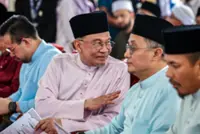
Dearly remembered: Member of the public seen praying for their departed loved ones at Kwong Tong Cemetery, Kuala Lumpur during the Qing Ming festival. — YAP CHEE HONG/The Star
PETALING JAYA: Exasperated with having to clear tonnes of waste every year, leading Chinese associations in the country have implored those observing Qing Ming to go easy on the burning of joss paper and food offerings.
The management of Kwong Tong Cemetery, the largest and oldest one in Kuala Lumpur, had to hire several five-tonne lorries to clear some 150 tonnes of “tomb-sweeping garbage” every Qing Ming for the past several years.
Federation of Chinese Associations Malaysia (Huazong) president Tan Sri TC Goh said the management of most cemeteries have had to deal with similar challenges during Qing Ming, also known as Tomb Sweeping Day or Chinese All Souls Day.
Calling for “greener” Qing Ming practices, Goh said this would be in line with modern development and environmental protection.
“Such practices contribute to the cleanliness and beautification of the cemetery, preventing garbage accumulation, which can be unhygienic.
“It should be regarded as one of the ‘reform movements’ of the Chinese community,” he said in an interview.
Goh said this would require cooperation from the Chinese community to not just generate waste but to comply with the regulations set by the authorities.
“Even if the offerings are not taken home, it is important to put them or other food items in the designated sorting bins or trash cans that have been provided for easy disposal,” he said.
In some countries, Goh noted that tomb-sweeping only involves the offering of incense or flowers.
He said Kwong Tong Cemetery had managed to reduce “leftovers” to about 35 tonnes in 2021 after adopting a series of measures.
However, he said this amount was still massive.
“As such, the management has to make the same appeal and put in efforts every year,” he added.
Kwong Tong Cemetery, which was started in 1895, has some 200,000 graves and 100,000 columbariums.
It is the burial place of many historical figures, including Yap Ah Loy, who founded the capital city.
Managed by the association, the cemetery covers 106ha, mostly at Bukit Seputeh with another smaller site in Sungai Besi next to the Middle Ring Road 2 near Taman Connaught.
Federation of Selangor and KL Chinese Cemetery Associations executive adviser Lee Chun Kong said people should take the offerings home after the prayers instead of leaving them at the graveyard.
“Let’s avoid food waste, especially when food security has become a concern in recent years,” he said.
Lee, who is also Kwong Tong Cemetery Management Association chairman, said they have been advocating for years for visitors to not come with excessive offerings.
“We have had people who came with an entire roasted pig, steamed chicken, braised duck, fruits and a variety of cooked dishes.
“Such food, when left behind after the ritual, would be a waste. It would also attract stray or wild animals.
“We have to clear out so much trash, which could have been repurposed for better reasons,” he said.
To a question, Lee acknowledged the necessity of upholding traditions but he said some rituals should be aligned with better practices.
He cited the practice of burning paper paraphernalia, saying that some families tend to do it excessively when offering their prayers.
Lee maintained that it would not be a sign of disrespect or lack of filial piety towards their ancestors if the families were to take home their offerings or burn less joss papers.
“Some people think that the more they burn, it shows that they are being ‘more filial’. But that is not the way.
“It was our behaviour towards them when they were alive that mattered and our sincerity in paying tribute to them while cleaning the graves.
“This is what reflects the true meaning of Qing Ming and tomb-sweeping,” he added.
Qing Ming is an occasion for family members to get together to pay homage to their ancestors.
This year, the festival falls on April 4.
However, it is usually observed throughout the 10 days before or 10 days after the actual day.
Federation of Taoist Associations Malaysia president Tan Hoe Chieow said Taoists would make offerings like Chinese tea, rice wine, fruits, pastries and the favourite dishes of their ancestors.
“After the prayers, all family members will remain at the grave site and eat the food.
“If they can’t finish it, the food will be taken home. Nothing is wasted,” he said.
Tan also called on the people not to be excessive in burning silver and gold joss paper to avoid wastage and pollution.
“Practise minimal burning and adhere to the traditional paraphernalia like paper clothes.
“Avoid the use of commercially-produced items like paper cars, watches, bags and other modern creations that exploit filial piety,” he said.











































